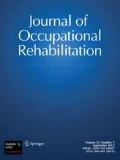Abstract
Introduction: There is a need to create, disseminate, and implement new knowledge in the work disability prevention (WDP) field. Training programs attracting high-quality applicants and taking into account the complexity of this emerging field are urgently needed. Methods: An advanced training program, funded by the Canadian Institutes of Health Research (CIHR), was developed by 24 mentors affiliated with nine different universities. The main objective of this program is to develop transdisciplinary knowledge, skills, and attitudes regarding WDP. This program has been developed for PhD students or post-doctoral fellows already registered full-time in a Canadian or recognized foreign university whose main interest is WDP, regardless of the health problem. Results: Since its implementation, the program received two successive cohorts of 10 students. They were registered in 13 universities in five countries and trained in nine different disciplines. Conclusions and significances: Appropriate WDP research may save major societal costs attributable to prolonged work disability. The proposed training program will contribute to developing tomorrow’s research workforce.
Similar content being viewed by others
References
Limoges J. Pourquoi travailler? In: Limoges J, Lemaire R, and Dodier F, ed. Trouver son travail. Montréal: CIM Fides, 1987, pp. 13–27.
Baril R, Martin JC, Lapointe C, Massicotte P. Éetude exploratoire des processus de réeinsertion sociale et professionnelle des travailleurs en réeadaptation. Montréeal: Institut de recherche Robert-Sauvée en santée et séecuritée du travail (IRSST), 1994.
Spitzer WO, LeBlanc FE, Dupuis M. Scientific approach to the assessment and management of activity-related spinal disorders. A monograph for clinicians. Report of the Quebec Task Force on Spinal Disorders. Spine 1987; 12: 51–59.
Waddell G. The back pain revolution. Edinburgh: Churchill Livingstone, 2000.
Health Canada. Economic burden of illness in Canada 1998. Ottawa, ON: Health Canada, 2002.
Frank J, Sinclair S, Hogg-Johnson S, Shannon H, Bombardier C, Beaton D, Cole D. Preventing disability from work-related low-back pain: New evidence gives new hope—If we can just get all the players onside. CMAJ 1998; 158: 1625–1631.
Loisel P, Durand MJ, Berthelette D, Vézina N, Baril R, Gagnon D, Larivière C, Tremblay C. Disability prevention—New paradigm for the management of occupational back pain. Dis Manag Health Outcomes 2001; 9: 351–360.
Feurerstein M. A multidisciplinary approach to the prevention, evaluation, and management of work disability. J Occup Rehabil 1991; 1: 5–12.
Waddell G. Biopsychosocial analysis of low back pain. Baillieres Clin Rheumatol 1992; 6: 523–557.
Frank JW, Brooker A, DeMaio SE, Kerr MS, Maetzel A, Shannon HS, Sullivan TJ, Norman RW, Wells RP. Disability resulting from occupational low back pain. Part II: What do we know about secondary prevention? A review of the scientific evidence on prevention after disability begins. Spine 1996; 21: 2918–2929.
Baril R, Clarke J, Friesen M, Stock S, Cole D. Management of return-to-work programs for workers with musculoskeletal disorders: A qualitative study in three Canadian provinces. Soc Sci Med 2003; 57: 2101–2114.
Waddell G, Aylward M, Swawney P. Back pain, incapacity for work and social security benefits: An international literature review and analysis. London: Royal Society of Medicine Press Ltd, 2002.
Waddell G, Main CJ, Morris EW, Di Paola M, Gray IC. Chronic low-back pain, psychologic distress, and illness behavior. Spine 1984; 9: 209–213.
Dobren AA. An ecologically oriented conceptual model of vocational rehabilitation of people with acquired midcareer disabilities. Rehabil Couns Bull 1994; 37: 215–228.
Parker RM, Szymanski EM, Hanley-Maxell C. Ecological assessment in supported employment. J Appl Rehabil Couns 1989; 20: 26–33.
Bronfenbrenner U. The ecology of human development experiments by nature and design. Cambridge, MA: Harvard University Press, 1979.
van Tulder MW, Croft PR, van Splunteren P, Miedema HS, Underwood MR, Hendriks HJ, Wyatt ME, Borkan JM. Disseminating and implementing the results of back pain research in primary care. Spine 2002; 27: E121–E127.
Agency for Health Care Policy and Research, Clinical Practice Guideline: Acute low back problems in adults. US Department of Health and Human Services: Rockville, 1994.
Dutch Society of Occupational Physicians, Practice guidelines for low back pain, 1999.
Grol R, Jones R. Twenty years of implementation research. Fam Pract 2000; 17: S32–S35.
de Freitas L, Morin E, Nicolescu B, Charter of Transdisciplinarity. 1994, International Center for Transdisciplinary Research, http://nicol.club.fr/ciret/english/charten.htm.
Peterson’s Annual Guides to Graduate Study. Graduate programs in Business, Education, Health, Information Studies, Law and Social Work (book 6). 35 ed, 2001.
Commonwealth Universities Yearbook 2000. A directory to the Universities of the Commonwealth and the Handbook of their Association. London: John Foster House, 2000.
Annulaire national des universités. Conférence des préesidents d’!université. France: L’Étudiant, 2001.
Lasnier F. Réeussir la formation par compétences. Montréal: Éditions Guéerin, 2000.
Henri F, Lundgren-Cayrol K. Apprentissage collaboratif à distance: pour comprendre et concevoir les environnements d’apprentissage virtuels. Sainte-Foy: Presses de l’Université du Québec, 2001.
Wilkerson L, Gijselaers WH. Bringing Problem-Based Learning to Higher Education: Theory and Practice. New Directions for Teaching and Learning. San Francisco: Jossey-Bass Publishers, 1996.
Palloff RM, Pratt K. Building Learning Communities in Cyberspace. Effective strategies for the online classroom. San Francisco: Jossey-Bass Publishers, 1999.
Université de Sherbrooke, Politique 2500-007. Évaluation périodique des programmes. 2001, Université de Sherbrooke, http://www.usherbrooke.ca/accueil/documents/politiques/2500-007.pdf.
Author information
Authors and Affiliations
Consortia
Corresponding author
Additional information
Raymond Baril, Denis Gagnon, André Lacroix, Christian Larivière, Serge Marchand (Université de Sherbrooke, Sherbrooke, Québec, Canada); Claire Bombardier, Donald Cole, Jaime Guzman, Sheilah Hogg-Johnson (University of Toronto, Toronto, Ontario, Canada); Bertrand Arsenault, Élisabeth Dutil (Université de Montréal, Montréal, Québec, Canada); Diane Berthelette, Katherine Lippel, Nicole Vézina (Université du Québec à Montréal, Montréal, Québec, Canada); Jean-Pierre Brun, Clermont Dionne, Hélène Moffet (Université Laval, Québec, Québec, Canada); Juliette Cooper (University of Manitoba, Winnipeg, Manitoba, Canada); Daniel Imbeau (École Polytechnique de Montréal, Montréal, Québec, Canada); Richard Wells (University of Waterloo, Waterloo, Ontario, Canada.); Annalee Yassi (University of British Columbia, Vancouver, British Colombia, Canada). Program website: http://www.usherbrooke.ca/wdp.
Rights and permissions
About this article
Cite this article
Loisel, P., Côté, P., Durand, MJ. et al. Training the Next Generation of Researchers in Work Disability Prevention: The Canadian Work Disability Prevention CIHR Strategic Training Program. J Occup Rehabil 15, 273–284 (2005). https://doi.org/10.1007/s10926-005-5936-8
Issue Date:
DOI: https://doi.org/10.1007/s10926-005-5936-8



